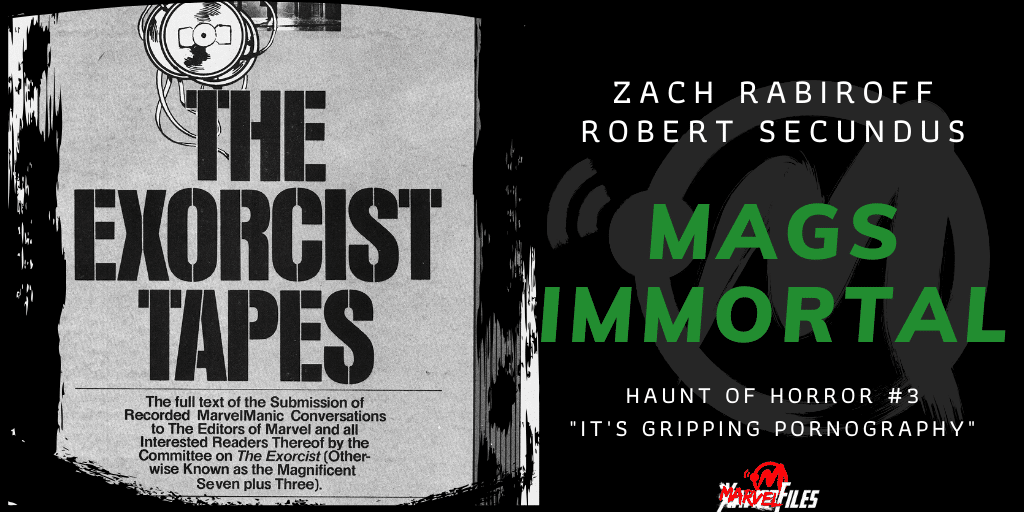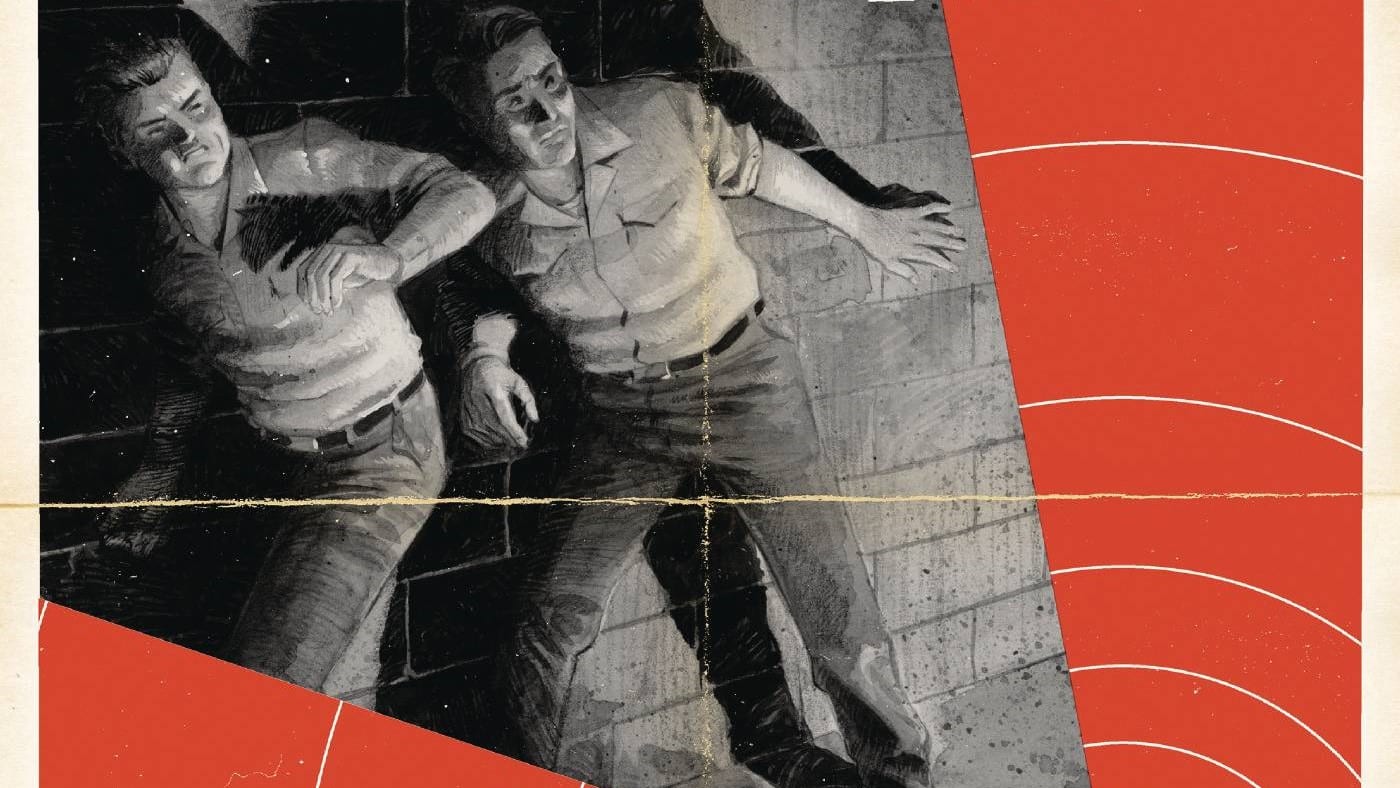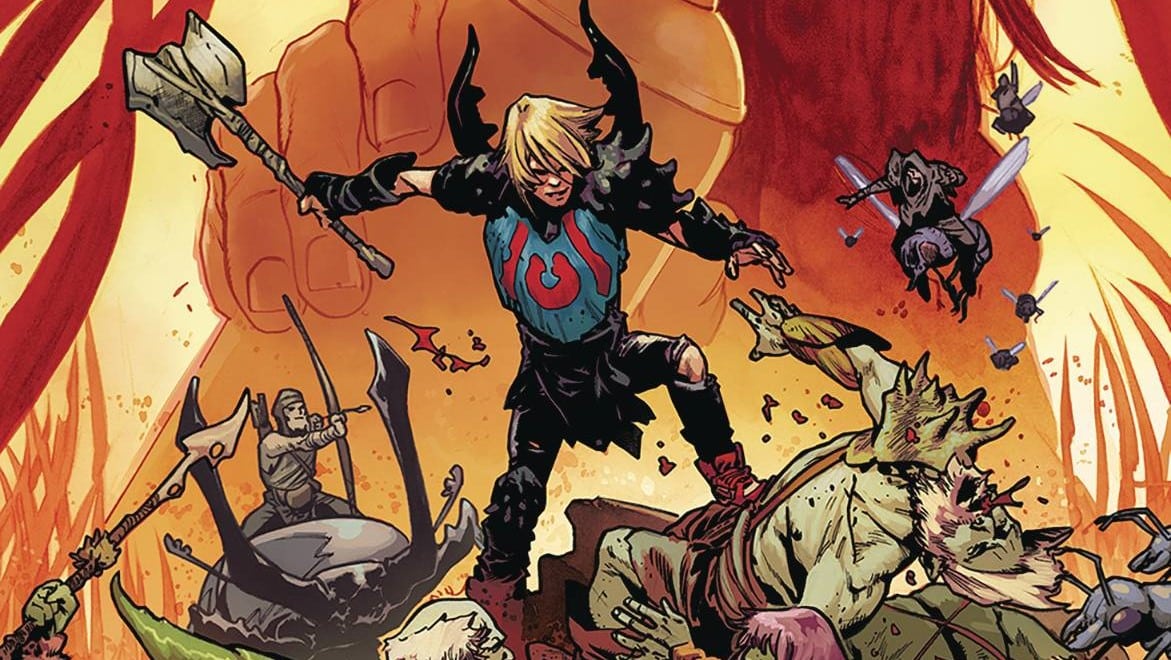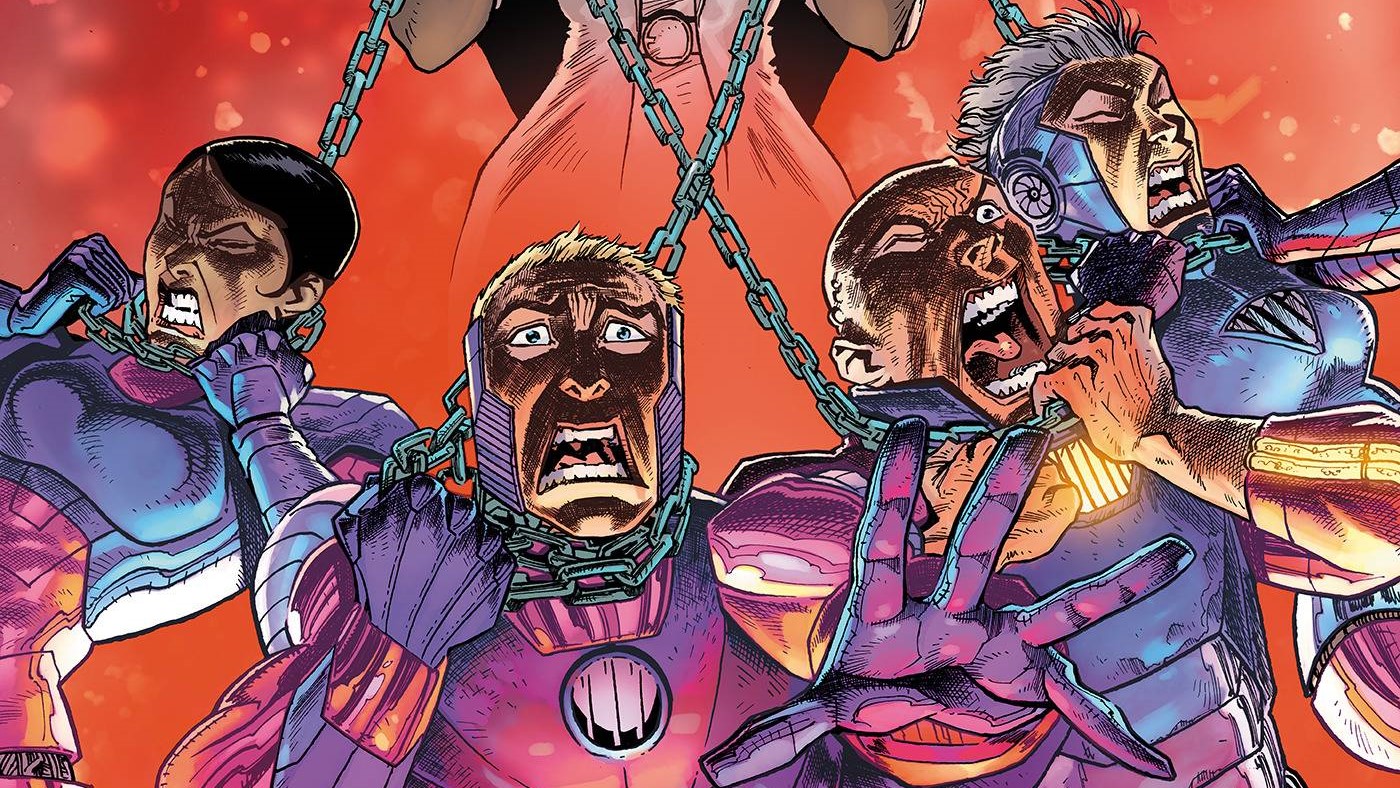Mags Immortal is a spinoff of Times Immortal, where Robert Secundus and Zach Rabiroff dive into the weird and wild world of 1970s Marvel Magazines.
CW: violence, implied sexual violence, incest, suicide, torture, and religious trauma
Robert Secundus: Last time on Mags Immortal we looked at some wonderful comics. But they weren’t what really wowed me about the magazine, as much as I enjoyed them. No, it was “The Exorcist Tapes: Part 2” that transformed me instantly into a Marvel Mag collector, so today Zach Rabiroff and I’ll be talking about the wonderful prose of Haunt of Horror.
The Exorcist Tapes

RS: Around the time of publication, The Exorcist adaptation had just been released, and so the Marvel bullpen (in this case: Chris Claremont, Gerry Conway, Steve Gerber, Carla Joseph, Don McGregor, Sandy McGregor, Glynis Wein, Len Wein, Marv Wolfman, and Michele Wolfman) saw it, got together, got drunk, hit “record” and had a two hours discussion about their experience, transcribed here for our pleasure. Zach: I did not know that Marvel used to do podcasts! Is this sort of thing common in the Magazines?
ZR: Alas, not nearly as common as I would wish or hope, if for no other reason than that readers hated it. A summary of feedback in issue #4 describes reader comments thusly: “One agonizing evening in the lives of ten Marvel writers, their wives, and a cassette recorder.” I have no idea what people were buying Haunt of Horror to see — given that it was canceled with issue #5, I suspect not much — but it apparently wasn’t this. And yet it’s exactly this off-the-cuff, unfiltered glimpse into the culture and character of the Marvel staff that makes the magazine line so infinitely intriguing to me.
RS: That is wild to me, Zach. I mean, I know I’m biased as a reader returning to it decades later; it’s a window into the past, and a window into the lives of the people that shaped Marvel comics. But setting that aside, it’s 1. An absolute delight to read and 2. Exactly the kind of thing that made the Marvel comics community! It feels like the natural extension of everything Lee did to make the readers parasocially invested in the Marvel bullpen.
ZR: Meanwhile, a bit of background to why this piece is here in the first place. It’s easy to forget it now, but The Exorcist was basically the Star Wars of its day: a film that inspired enormous controversy, massive ticket sales, round-the-block lines on premiere day, and 10 Academy Award nominations to boot. To say that it had an impact on the culture of horror writing would be a tremendous understatement, and that’s before we even get into the topic of edgy discomfort in the film’s subject matter, which the panelists waste no time discussing.
RS: It’s a really engaging discussion about horror, craft, and criticism. The film affects them to varying degrees; Sandy McGregor could not watch it, and spent most of the runtime staring at the floor, but Chris Claremont “didn’t think it was a horror film. . . except in the sense that Night of the Living Dead was a horror film because you saw people eating intestines, and I didn’t find that particularly horrifying. I just found it kind of gross.” Nearly everyone left the theater to some degree disturbed or haunted by its images– but they disagree if that means the film is good.
ZR: It’s difficult, from the distance of time and a thousand horror films of exponentially increasing luridness, to imagine just how visceral an effect The Exorcist had on its original viewers. But that impact is one of the first things that becomes clear from this roundtable. Marv Wolfman talks about wanting to vomit while he was watching the movie; Sandy McGregor says she had to shut her eyes every time the young girl appeared on screen. But at the same time, these are professional creators, and they seem aware at every turn of just how effectively and efficiently they’re being manipulated by these sensations. And you can really see them struggling to rectify their intense dislike of the film’s tactics with their undeniable awareness that they worked. At one point, Sandy McGregor asks, “If you went in, and you paid three-fifty or four dollars [Ed. note: !!!] and you sat down for two hours and you came out like this from a movie that’s supposed to do that to you, don’t you think it accomplished what it set out to do?” To which Gerry Conway replies, “All right, but entertainment goes on on several levels…not just your gut, it’s also your mind.” It’s a great question, to which they can’t find an easy answer. What is The Exorcist even trying to say? And does it matter?
RS: Claremont (who spends most of the conversation quiet, only occasionally chiming up to troll the other participants) probably rejects the film in the strongest terms used throughout the conversation: “I really resent the film; I resent what it does… it’s gripping pornography.” Later, he does find some message in the film, something beyond the grossness:
RS: According to Chris Claremont, The Exorcist is nothing more than an extremely gross piece of Jesuit Propaganda!
ZR: Claremont’s theological outlook, then and now, is utterly fascinating and baffling to me. I sometimes get the sense that he puts a whole lot of stock in divine forces, but absolutely none in religion (or perhaps, like George Costanza, he believes in God, but only for the bad things). But while this graduate of a Jesuit theology program might find his particular position on Catholic cinematic politics a bit, ah, rough…well, he nevertheless has a point. There’s something fundamentally conservative in The Exorcist’s outlook, insomuch as it suggests that the universe is filled with wild and terrifying forces, but the Church has it covered, so don’t worry too much about it. Claremont doesn’t mention it, but that ethos even extends to the movie’s treatment of the culture at large, with the Hollywood-elite mother (starring in a movie about Ho Chi Minh!) representing everything feckless and broken that allows the Devil and his minions into the world. In retrospect, The Exorcist might have been an early warning sign that the ‘60’s and ‘70’s counterculture was about to give way to something more nostalgic and self-consciously traditional. And I think we can see in this round table (more clearly, maybe, than even the panelists could) that the extremely countercultural Marvel bullpen was reacting to that in a very ambivalent way.
RS: How countercultural? I present, unabridged, unredacted, the moment when the McGregors leave the pod:
RS: If I have one complaint about this magazine, and this roundtable, it’s that we do not get the transcript of the Marvel Bullpen Debate On Whether Some Pornography Is Art. Zach, can you imagine a paragraph like this being published in an official Marvel publication today?
ZR: This is just a phenomenal moment in the transcript, and I simply do not think that those readers of the time appreciated what they were getting here. Pearls before swine, Robert, pearls before swine. But it’s not just that I can’t see a moment like this ever making it into Walt Disney Corporation-published material in this Year of Our Lord 2020, it’s that I cannot even fathom such a thing occurring. Is it even remotely conceivable that current Marvel freelancer and their spouse would publicly excuse themselves from a staff function in order to take in a nice little porno, while the rest of the creators chatted about the merits and demerits of OnlyFans content? I mean, Chip Zdarsky would do it, but C.B. Cebulski wouldn’t be okay with it, is what I’m saying.
RS: What really saddens me is I can’t even see Marvel releasing a PG version of something like this today. When Marvel actually gathers its creators together to do something, it’s for one of two things: 1. A panel at a comic con, where creators give semi-scripted teases for upcoming releases, announce new titles, or diplomatically attempt to answer fans begging for spoilers in the Q&A; or 2. Youtube videos consisting of a montage of editors saying “this book coming out: is good” and the creators of the book repeating a Marketing Department-approved pitch for the book’s concept. That’s it.
Would I listen to 2 hours of Vita Ayala, Tini Howard, Leah Williams, Ben Percy, Bryan Hill, and Chip Zdarsky talking about horror, criticism, art, and The Exorcist? Hell yeah I would! So would a lot of people. I’d love nothing more than to hear the creators of the books I love sit down and talk. But I think Marvel isn’t just too lazy when it comes to promoting its creators– I think Marvel’s current attitude towards its creators is completely the opposite of what it was in the past. Marvel does not want you to be a fan of the Marvel Bullpen; those are people, and people who produce comics that are not owned by Disney. No, Marvel wants you to be a fan of Disney Copyrighted Characters; Marvel ideally wants an Iron Man book to sell well regardless of who is on it, and Marvel really does not want you to leave Iron Man and pick up a creator’s independent work.
The apparent exceptions are, of course, when Marvel brings on a star, whether it’s a poetry star like Eve Ewing, a YA star like Rainbow Rowell, a nonfiction star like Ta-Nehisi Coates, or a comics star like Jonathan Hickman. But it’s not the people that Marvel really cares about; Marvel almost certainly would still never produce a podcast where Coates sat down and chatted with someone about his thoughts on politics, culture, comics, and his Marvel work. Marvel does not want comics readers to be a fan of Hickman the Person, a human being with ideas; Marvel wants comics readers to be a fan of Hickman the Brand, which is something they can manage, filter, make nice and tidy and uncontroversially marketable.
ZR: And it’s not just the company, if we’re being totally honest. Even if we lived in a world where Marvel wanted to let Ta-Nahisi Coates talk about the politics and social philosophy behind Black Panther, and even if we lived in a world where Coates wanted to do it, would the fans even want to listen? In the forty years since this piece was published, the reader has become the Fan with a capital “F”, and the entire comics culture has coalesced around something more universal but infinitely more shallow than what we see suggested throughout this magazine. When questions are posed to creators, they’re invariably about the whereabouts of personal faves who readers think have been mistreated by storylines, or petty continuity complaints that haven’t been sufficiently addressed. They certainly aren’t about ideas, politics, or the underlying intentions of a run — and how many creators even find those things worthwhile to think about in the first place? Somewhere along the line, the IP replaced the character, and the spoiler replaced the story, and there’s a big part of me that can’t help feeling it in the pit of my stomach.
And I think, ultimately, that’s what I find so endlessly gripping about this piece. It’s a frozen moment in time when everything about Marvel Comics really did seem wild and unregulated. The same chaotic industry and crashing market that created these horror magazines in the first place also generated a staff and an environment in which the old rules didn’t apply, and the counterculture was the culture. It wouldn’t last, and not just because of corporate ownership: the other side of the incredible quality of the Jim Shooter era was that it brought an end to the unpredictable atmosphere of this phase. But while it lasted, it was something to behold, and we can see it here in all its seedy glory.
But on the other hand, it could also give us something like the following.
Doug Moench’s Diseased ****
RS: The final magazine entry we’re going to be talking about today is “Flirting With Mr. D,” where the D could stand for its author, Doug Moench, for Devil, or for, well. Something unprintable at xavier files dot com. It’s a neat article, because it brings together the two other major pieces in the magazine: it talks about Moench’s process writing the “Gabriel: Devil Hunter” comics while comparing Moench to William Peter Blatty. You see, Moench used to mock Blatty for the way the man described his writing process, a series of SPOOKY events in the middle of the night that, he implied, were evidence of his having tapped into demonic forces in his text.
ZR: Mocked, that is, until Moench experienced a spooky experience of his own that…well, I need to be delicate about this, because we’re trifling with forces very dangerous to a very particular part of our well-being, as the following paragraphs will illustrate. Some months prior to the writing of the article, we are told, our dear Mr. Moench dated a witch. This is the normal part of the story, so bear with me. Being, we are told, something of a male chauvinist, Mr. Moench broke up with the witch on bad terms, and, as is typical in such situations, received a parting curse, to which he paid no mind.
Then he began work on his Gabriel, Devil Hunter series, at which point a malfunction of a very specific anatomical nature began to affect…oh, to hell with it: something absolutely hideous happened to Doug Moench’s junk, y’all:
The propriety of this magazine dictates that I remain vague about it, but it was something which affected a physiological function in a lividly shocking way. To say I freaked out is an understatement. The urologist claims it’s the worst case of this condition he’s ever come across, describes its effect — in me alone — as exquisitely excruciating, and avers that only indefinitely prolonged treatment will ameliorate the situation. In other words, after two months of treatment which eat up a half-hour of each day, two hours of one day each month at the doctor’s office, and require that I swallow two pills a day…it hasn’t even begun to get better.
Robert. I am without words. I am overcome. Please help me understand where to begin with this.
RS: I think my favorite part of the story is that she broke up with him because he wrote horror fiction, which she found immoral. Except, unlike conservative parents and pastors at the time, she found horror comics immoral not because they promoted Satan worship, but because they mocked the dark lord who schemes below us all, typically revealing Lucifer, in the end, to be nothing more than a cosmic loser. And so: Doug Moench’s poor, cursed, pained…. You know. The curse goes on to take out his typewriter, delaying the script, his door, trapping him in his apartment, to be rescued only by the Conways, and his stomach, giving him massive heartburn and destroying his appetite.
It ultimately jumps over to his artist, the aforementioned wondrous Billy Graham, who somehow spilled coffee three times on the climax of the story. Graham also does not leave the situation physically unharmed, as “he developed a severe pain in that portion of his anatomy which occupied his drawing chair.” Zach, Doug Moench’s hex-girlfriend cursed Billy Graham’s butt. What is this story?!
ZR: I don’t think it’s an exaggeration to say that, in a great many ways, your entire life has really been leading up to typing that penultimate sentence.
In any event, there are a couple of things to unpack here in order to understand what we just read. The first is the degree to which demonic and supernatural occurrences were very clearly and sincerely taken as reality by the writers responsible for this magazine. The unfathomably confessional tone of the piece (confirmed by editorial notes in subsequent issues) affirm that this is not some cleverly high-concept work of fiction. This is autobiography, plain and simple: Doug Moench has been genitally cursed by a witch, and he has come to warn us lest we fall prey to the same fate. There but for the grace of the unholy covens go we.
The second thing that stands out to me is that the source of the heartbroken witch’s ire — that Moench was failing to give the Devil his due in his handling of horror fiction — actually bears quite a similarity with the critique leveled by Chris Claremont during the Exorcist discussion. It boils down, essentially, to the notion that Moench’s (or Blatty’s) brand of horror fiction is an inherently conservative genre: even though it pays lip service to the power of Satan and his minions, it always and ultimately comes down on the side of order, normality, and the strength of God, Church, and apple pie. These stories (like Moench’s story here) are warnings, not invitations. They tell the reader: do not eat the forbidden fruit, do not open Pandora’s Box, do not gaze into the gaping maw. This brand of horror, in other words, is about catharsis. It dredges up fear and evil only in order to purge it from inside of us. Moench seems to be okay with this. Claremont has his doubts. All of which leads me to the obvious question that I think we’re all wondering: could Doug Moench’s crotch-cursing witch have been Chris Claremont all along?
RS: If cons ever exist again, we’ll need to investigate. We’ll walk up to Christopher Claremont and say, “We know how you feel about DoX and HoXPoX– but what do you know about Doug Moench’s DIXHEXPOX?!”
I think the story is also exploring one of my favorite areas of study; it’s not just an autobiographical account, it’s not just a horror story, it’s also grotesque comedy. It’s the kind of comedy that explores the blurry boundaries between humor and horror. Just as Moench moves from mockery to bemoaning his fate, we move from the terror of the horror stories and unsettling memory of The Exorcist to laughing at Moench as his typewriter goes flying across the room or his doorknob falls off. But when he worries about, well, a different knob possibly falling off, we giggle but also cringe. When, every time, in both the script and pencilling, things repeatedly go wrong at the same exact panel, we laugh– but also go, “what if?” This kind of grotesque comedy, I feel, doesn’t always completely purge the terror– or else, after the moment of catharsis, it leaves something else, some little seed to grow in the now vacant space.
Then again, maybe it’s just me, and I’m even unsettled by Doug’s infernal phallus afflictions because I spent a good 40% of my childhood in a dark Church basement reading “true” accounts of demonic possession, satanic cults, and visions of Hell.
ZR: And so, with tools bewitched but spirits undaunted, we end our inaugural voyage into the world of Marvel horror magazines. I don’t know about you, but I’ve found this experience, and the magazines generally, to be illuminating. My introduction to Marvel Comics as a kid was through the eras of the two Lees, Jim and Stan. And while neither represented a comics company that was sterile or corporate — that would come later — they certainly represented one that was bright, both literally and figuratively. Stan Lee’s Marvel was the Marvel of the New Frontier and the Great Society: jittery and a little neurotic, yes, but in the end suffused with the optimism of a culture that believed science, understanding, and Great Responsibility would always be enough to see it through.
These magazines, though: they’re the other side of that, the hidden belly that would have wiped the smile right off of Smilin’ Stan’s face. They’re the writhing, squirming, offensive, uncomfortable, inadvertently hilarious psychoses underneath every well-groomed issue of Iron Man and Marvel Team-Up. They may not have lasted. They may not even have deserved to. But I’m glad for every page of them I’ve gotten to read.
RS: I remain tremendously excited to explore this weird realm further; it’s not just a glimpse into a fascinating moment in the past, but, I feel, extremely relevant to today. It’s not just that the stories themselves, for the most part, hold up; this magazine as an object is willing to experiment with what a comics company could do, with what kinds of stories it could publish, what ways it could represent its creators, and what formats in which it could produce something special. It’s the kind of energy I think we really need today.
Magazine Miscellany:
- Don McGregor, in the middle of describing what it was like to stand in line for four hours and chat with everyone about why they were going to see the movie, gives a glimpse at the real NYC of the 1970s: “Strange thing, we’re standing out in the cold and I’ve got my tickets and I’ve been waiting two-and-a-half hours to get in for the next show and ana amazing amount of camaraderie started to develop amongst the people standing out there on this. . . y’know, it was one of the few times in New York City where everybody was just talking to each other and asking each other questions and just sort of rapping in general. A guy came over with a bottle of champagne and he couldn’t get it open so a girl all-of-a-sudden pulled a switchblade with, uh, maybe a two-foot long blade, and I said, (EXPLETIVE DELETED) [Ed. note: deleted by Marvel in the transcript], am I glad I didn’t mess around with her! And she whipped the thing off and he poured us a glass of champagne.”
- Later, McGregor notes that behind him in his showing of The Exorcist was a man and two women sitting on the man’s lap, all individuals who apparently went to the movies to have an extremely good time– and soon they were just sitting there, on top of each other, unmoving, silent, staring in horror for hours at the screen.
For those waiting with sphincter muscles tensed to learn the outcome of our dear Mr. Moench’s saga, an editorial note in House of Horror #5 assures us that “Doug himself is looking well these days.”
Zach Rabiroff works daily at a charity, and is also a freelance writer and editor. He reads a lot of comics.
Robert Secundus is an amateur-angelologist-for-hire.







